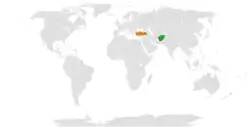Afghanistan–Turkey relations
Afghanistan–Turkey relations refers to bilateral relations between Afghanistan and Turkey.
 | |
Afghanistan |
Turkey |
|---|---|
Ahmet Davutoğlu has described this relationship as "exemplary" even if the two countries do not border, but are close. A recent survey in Kabul of 1,259 people shows that Afghanistan rely mostly on Turkey, and consider Turkey to be Afghanistan's one and only true, best friend (as of July 2012). Afghanistan's envoy to Turkey said that "Afghan people love Turkish soldiers in Afghanistan like their sons".[1] Afghanistan was also the second nation to recognise the Republic of Turkey, after the Soviet Union, on 1 March 1923.[2]
Both countries established education and cultural exchange programs. Inside Afghanistan Turkish schools were established. Furthermore, Turkish army officers assisted or even commanded the training of Afghan military members. The foreign relations of Afghanistan have changed so much politically, socially and economically. Today the relations between the two countries go beyond giving military education.
Country comparison
| Population | 32,225,560 | 83,154,997 |
| Area | 652,230 km2 (251,830 sq mi) | 783,356 km2 (302,455 sq mi) |
| Population density | 25/km2 (64.7/sq mi) | 105/km2 (271.9/sq mi) |
| Capital | Kabul | Ankara |
| Government | Unitary presidential Islamic republic | Unitary presidential constitutional republic |
| Current Leader | President Ashraf Ghani Vice President Amrullah Saleh |
President Recep Tayyip Erdoğan Vice President Fuat Oktay |
| Official languages | Pashto, Dari | Turkish |
| Main religions | 99.7% Islam, 0.3% Others | 97.6% Islam, 1.1% Judaism, 0.3% Christianity |
| Ethnic groups | 42% Pashtun, 27% Tajik, 9% Hazara | 85% Turkish, 9% Kurdish 6% Others |
| Human Development Index (HDI) | 0.496 (low)[3] — 170th | 0.806 (very high)[4] — 79th |
| GDP (PPP) | $72.911 billion ($2,024 per capita) | $2.464 trillion[5] ($29,326 per capita) |
History

Afghanistan and Turkey relations spans several centuries, as many Turkic and Afghan peoples ruled vast areas of Central Asia and the Middle East particularly the Ghaznavids, [Seljuks], Khalji, Timurid, Lodhi, Mughal, Afsharid, and Durrani empires. Throughout its long history, many Ottoman officials were in close contact with Afghan leaders even up until the early 20th century when the Ottoman administrator Ahmad Jamal Pasha went to Afghanistan where he worked on modernizing the Afghan armed forces. Ertuğrul Osman, the former head of the Imperial Ottoman Dynasty, was married to Zeynep Tarzi Hanım Efendi, the daughter of Abdulfettah Tarzi, niece of the former King of Afghanistan, Amanullah Khan.
Afghanistan's heavy influence on the Atatürk regime further developed the brotherly relations between the two nations. Atatürk had supported Mahmud Tarzi and he had hopes of introducing Atatürkism into neighbouring Afghanistan. Following the death of Mustafa Kemal Atatürk, Afghanistan was deeply saddened, and Amanullah Khan, who was in exile in Rome made a special attendance. Afghanistan's support for Atatürk is further shown by being the only nation, apart from Turkey, to have kept their flag at half-mast, to initiate a week of mourning.[6] Despite the strong visibility of the Taliban in the east of the country, Atatürk's legacy still remains intact within Afghanistan, and March 1 is celebrated to commemorate Afghanistan's recognition of the Republic of Turkey.
Talks held in Moscow on 1 March 1921 resulted in the Turkey-Afghanistan Alliance Agreement and a period of intense cooperation. In 1937, shortly before the outbreak of World War II, Afghanistan, Iran, Iraq and Turkey signed the Treaty of Saadabad.
Modern relations
The War on Terror
Turkey has participated in the International Security Assistance Force (ISAF) since its inception with the deployment of 290- non-combatant support personnel in 2001 and has assumed command of ISAF II (June 2002 – February 2003) and ISAF VII (February–August 2005). According to Turkish Parliamentary Deputy Burhan Kayatürk; Turkey, which has the goodwill of the Afghani people, “can help win the hearts and minds of the Afghani people,” who, “like the Turkish soldiers,” and, “steer them away from militancy by strengthening the infrastructure in education, health and industry.”[7]
Turkish troops have not participated as combat forces but rather as logistical support and training Afghan personnel. Over 12,000 afghan soldiers and police have been trained.[8]
Turkish construction firms have subsequently also become active in the country. Turkey is responsible for maintaining security around Kabul, providing training for the Afghan Armed Forces and Afghan National Police and have undertaken a number of reconstruction projects in the fields of education, health and agriculture in the province of Vardak. Turkey’s support of the Bonn Agreement and the Afghan Constitution Commission resulted in an official visit to Turkey by Afghan President Hamid Karzai on April 4, 2002 and made a reciprocal visit to Afghanistan by Turkish Prime Minister Recep Tayyip Erdoğan a short time later.
Trilateral Ankara cooperation process

.jpg.webp)
Turkey launched a trilateral summit process between the two states and Pakistan in February 2007, following a visit by then Turkish Foreign Minister Abdullah Gül to Islamabad, as the backbone of its diversified foreign policy in Southeast Asia and Pakistani deputy Humair Hayat Khan Rokhri confirmed that according to Gül “we are all brothers who need to support each other,” in order to, “bring security and stability to the region.”[9]
An April 1, 2009 meeting between Afghan and Pakistani leaders, conducted as part of the trilateral Ankara cooperation process, saw the three countries pledged to increase coordination between their political, military and intelligence tiers in the fight against militancy and terrorism. Turkish Parliamentary Deputy Kayatürk has stated that, “It is the first time that the military and intelligence chiefs of Afghanistan and Pakistan have attended the trilateral summit, which is a reflection of the deeper commitment to work together.”[7]
Afghan and Pakistani parliamentary deputies came together in Ankara on May 5, as part of the trilateral Ankara cooperation process, where they met with the previous Turkish President Gül and new Foreign Minister Ahmet Davutoğlu to discuss a variety of issues. Head of the Turkish Parliament’s Foreign Relations Commission Murat Mercan stated;
“Today we need cooperation between our countries more than ever. I believe Turkey, having historical brotherhood relations with both, is in a special position to improve and deepen this cooperation. Turkey is confident that the cooperation to be established between Afghanistan and Pakistan will help a lot to solve the problems.”[10]
Vice-Chairman of the Afghan Parliament’s Foreign Relations Commission Mohammed Shakir Kargar responded by reaffirming this historical friendship built upon by Atatürk and thanked Turkey for its help with the post-Taliban restructuring. Mercan concluded, “We are finally on the verge of institutionalising the trilateral Ankara cooperation process within the framework of parliamentary joint initiatives,” with follow-up meetings due to be held in Islamabad and Kabul at four-month intervals.
After the very controversial 2009 election, President Karzai visited the President of Turkey in November 2009 to consolidate relations with other stakeholders in the region.[11] The president of Turkey affirmed that Turkey had to take an active part in stabilizing the region, taking up the torch of western activity in the region and specifically in Afghanistan.[11]
Afghan Embassy
The Embassy of Afghanistan in Ankara (Persian: سفارت كبرای جمهوری اسلامی افغانستان در انقره) is the diplomatic mission of the Islamic Republic of Afghanistan to Turkey. It is located at Cinnah Street 88, Kavaklıdere, Çankaya.
The current Afghan ambassador to Turkey is H.E. Salahuddin Rabbani.
See also
References
- "Afghan envoy to Turkey: "Turkish soldiers are loved in Afghanistan"". www.aa.com.tr.
- "Turkey offers condolences to victims of Afghan avalanche". www.aa.com.tr.
- "2019 Human Development Index Ranking | Human Development Reports". hdr.undp.org. Retrieved 2020-08-04.
- "List of countries by Human Development Index", Wikipedia, 2020-04-24, retrieved 2020-05-02
- "International Monetary Fund, Report on selected countries". imf.org. Retrieved 2017-06-24.
- "Republic Of Turkey Ministry Of Culture and Tourism". www.ktb.gov.tr.
- Bozkurt, Abdullah (2009-05-06). "Concerned Turkish deputy calls for active engagement in Pakistan". Today's Zaman.
- http://usacac.army.mil/CAC2/MilitaryReview/Archives/English/MilitaryReview_20130831_art007.pdf
- Bozkurt, Abdullah (2009-05-07). "Turkey, Afghanistan and Pakistan solidify cooperation". Today's Zaman.
- "Afghan, Pakistani lawmakers meet in Turkish Parliament". Today's Zaman. 2009-05-06.
- Butler, Daren (9 November 2009). "Karzai seeks closer trade ties with Muslim nations". Rueters. Retrieved December 5, 2009.
